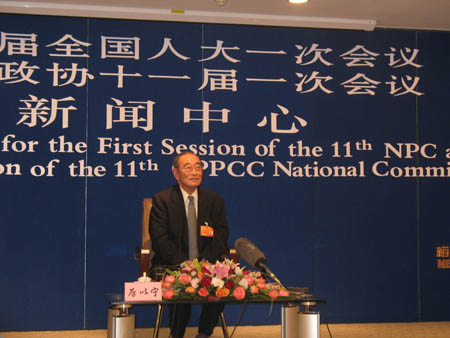Li Yining, one of the most prominent economists in China and member of the National Committee of the Chinese People's Political Consultative Conference (CPPCC), discussed the parameters of today's hotly debated economic issues confronting China during an interview yesterday afternoon.
 Li Yining talks about China's economic issues during an interview yesterday afternoon.
Li Yining talks about China's economic issues during an interview yesterday afternoon.
For ordinary Chinese citizens, inflation has emerged as a major concern. Mr. Li said the complexities of inflation have exceeded the predictions of experts. He cited huge investments, sizable foreign exchange reserves, an appreciated RMB and the disastrous snowstorm of mid-January all as contributing factors.
"Another problem in China is excess liquidity fueled by the foreign exchange reserves and RMB appreciation. Comprehensive measures should be implemented to handle the issue," he remarked.
"In the first place, the government should ensure the supplies of badly needed goods. Secondly, China can import more products such as natural resources and equipment; this would help ease the trade surplus and slow rising prices.
"Consumer prices have jumped to a 7.1 percent record in January, almost entirely from rising food prices. Yet it is not a surprise that consumer prices continued to surge in the first half of this year, because it requires time for the country to grapple with the fallout from the freak storm," he explained.
"I believe the goal of capping inflation at 4.8% this year can be achieved, excluding the impact of international market and extreme emergences," the 78-year-old man asserted.
When asked about the mounting pressure to allow the value of RMB to appreciate against other currencies, he responded that a reasonable appreciation could help prevent excessive liquidity. "The interest rate should be subjected to market forces," he added.
"Last year's economic growth was so strong that it even outpaced the projections of the analysts and the government. I think this year the economy will remain strong but not as strong as last year."
Mr. Li, who always shuns criticizing the stock market, also touched on the delicate topic in the interview. "The current 0.3 percent stock-trading stamp tax which is levied on both transaction parties is not reasonable. It should be levied on only one side," he commented. As for stock market prospects, he said as long as the Chinese economy continues to surge, the stock market will remain largely healthy despite frequent fluctuations.
Mr. Li also refuted the viewpoint that the newly enacted Labor Contract Law would reduce China's appeal as a manufacturing base, saying that the law will bring a win-win situation in the long run and needs a series of moves and rules to complement it.
Profile of Li Yining
Born on November 22, 1930 in Jiangsu Province, Li Yining is a well-known economist in China. He is professor and Dean Emeritus of Guanghua School of Management, PKU. He graduated from the Department of Economics of Peking University in 1955.
(China.org.cn by staff reporter He Shan, March 11, 2008)